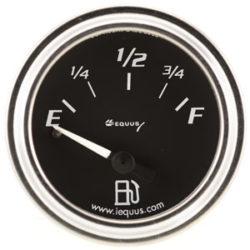Fueling Your Knowledge: Unveiling the Significance of Fuel Gauges
For a smooth and safe driving experience, it’s crucial to have a functional fuel gauge. It provides real-time information about your vehicle’s fuel level, allowing you to plan your trips and avoid running out of gas in the middle of nowhere. If your fuel gauge malfunctions, it becomes a matter of concern, as it can lead to inconvenience, reduced safety, and potential engine damage. Understanding the factors that influence fuel gauge repair costs can help you prepare for the expense and make informed decisions.

Image: www.ehow.com
Main Body
Types of Fuel Gauge Faults
Fuel gauge issues can manifest in various forms:
- Inaccurate readings: The gauge may display incorrect fuel levels, leading to confusion and miscalculations.
- Intermittent failure: The gauge may fluctuate or stop working intermittently, making it unreliable.
- Permanent failure: The gauge may cease to function altogether, leaving you with no indication of fuel levels.
Causes of Fuel Gauge Malfunctions
Several factors can contribute to fuel gauge problems, including:
- Faulty fuel level sensor: The sensor in the fuel tank provides input to the gauge, and its malfunction can lead to inaccurate readings.
- Wiring issues: Broken or damaged wires can disrupt communication between the sensor and the gauge.
- Gauge cluster failure: Internal component failure within the gauge cluster can impact fuel gauge operations.
Cost Factors for Fuel Gauge Repairs
The cost of fixing a fuel gauge hinges on several key factors:
- Vehicle make and model: Different vehicles require specific fuel gauge systems and parts, affecting repair costs.
- Type of fault: Inaccurate readings, intermittent failures, and permanent breakdowns may require varying levels of repairs.
- Labor costs: The time and expertise required for repairs influence labor charges.
- Parts replacement: If components need to be replaced, their cost and availability will impact the overall expense.
- Geographic location: Labor rates and parts availability can differ across regions.
Average Repair Costs
As a general guide, here are approximate repair costs for different types of fuel gauge issues:
- Inaccurate readings: Typically range from $100 to $300
- Intermittent failure: Between $200 and $500
- Permanent failure: From $300 to $700 or more
Factors to Consider in Decision-Making
When faced with a faulty fuel gauge, careful consideration of the following factors can aid in decision-making:
- Safety: A malfunctioning fuel gauge poses potential safety hazards. Running out of gas can strand you on the road, putting you and others at risk.
- Convenience: An inaccurate fuel gauge can lead to inconvenience and unexpected issues during travel.
- Repair vs. replacement: Determining whether repairs or complete replacement is more cost-effective in the long run is important.
- DIY vs. professional: DIY repairs can save money, but complex issues may require professional assistance.

Image: www.autozone.com
How Much Is It To Fix A Fuel Gauge
https://youtube.com/watch?v=t7kBe_sEKPg
Conclusion
Fuel gauge repairs can vary significantly in cost, influenced by factors such as the vehicle’s make and model, the nature of the fault, labor expenses, and parts availability. While DIY repairs offer potential savings, it’s crucial to assess your technical capabilities and the complexity of the issue before attempting them. Professional repairs ensure quality workmanship and often come with warranties for added peace of mind. Remember, a functional fuel gauge is essential for safe and hassle-free driving.







